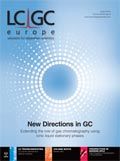PEFTEC International Analytical Conference and Exhibition for Petroleum, Refining, and Environmental Analysis
The PEFTEC International Conference and Exhibition for Petroleum, Refining, and Environmental Analysis will be held on 18–19 November 2015 at the Antwerp Exhibition Centre, Antwerp, Belgium

The PEFTEC International Conference and Exhibition for Petroleum, Refining, and Environmental Analysis will be held on 18–19 November 2015 at the Antwerp Exhibition Centre, Antwerp, Belgium. PEFTEC will gather together scientists, laboratory managers, chemists, and environmental regulators from the chemical, petrochemical, and oil industries to share information, network, and learn about the latest methods, standards, and regulations for the industry.
Known for its beautiful old city, beer, chocolate, and diamonds, Antwerp was also chosen for its position at the heart of Europe’s biggest cluster of petrochemical industries - boasting the world’s top 10 largest chemical producers (either their supply chain or production facilities). Companies with major facilities in the Port of Antwerp include BASF, Air Liquide, Bayer, Monsanto, and 3M, with both Exxon Mobile and Total refineries located in the Port itself.
This years’ conference will have two main themes. The first theme is separations and is headed up by Tom Lynch and Dr Frank David. Tom is from BP Fuels and Lubricants. He also sits on the BP Science Council and has over 35 years of experience in the petroleum industry. He specializes in delivering forensic, problem solving, and method development capabilities for BP globally.
Dr Frank David is R&D manager at The Research Institute of Chromatography. Dr David has authored over 100 papers and his expertise includes capillary gas chromatography (GC), supercritical fluid chromatography (SFC), GC coupled to mass spectrometry (GC–MS), high performance liquid chromatography (HPLC), and liquid chromatography coupled to MS (LC–MS) as well as multidimensional chromatography (GC–GC, GC×GC, LC–GC). These sessions will include topics on hyphenated techniques for petrochemical analysis; analyzing petroleumâderived products and problem solving with hyphenation; getting more from gas chromatography; chemical fingerprinting of crude oil; and novel detection technologies, which include developments in GC–MS for petrochemical applications.
The second theme for the conference will concentrate on environmental monitoring of air and water emissions in and around plants and refineries. The environmental sessions will be headed up by Rod Robinson. Rod is Principal Research Scientist at the National Physical Laboratory. He has a long history of working in standardization, and has been vice chair of CEN air quality and convenor of CEN TC 264 WG 38, which is currently standardizing the measurement of fugitive and distributed emissions of VOCs from refineries. Topics being presented in the environmental sessions will include discussions on standards, policy, priority substances, and legislation. Registration is now open for the conferences and “early bird” discounts are available.
Speakers from ASTM will present on method developments using recently developed methods as case studies to bring the development process to life in practical terms. They will also discuss the method review process at ASTM.
Running alongside the technical conferences are over 100 free to attend seminar sessions on case studies, new technologies, and applications. PEFTEC will also host a large two-day exhibition of over 130 of the world’s leading instrument manufactures, suppliers, and service providers for the petrochemical and oil industries. Technical product specialists will be on hand to discuss your application and analytical requirements and questions.
PEFTEC has been endorsed and supported by Concawe, Cefic, Eurolab, Petrochemical Europe, ASTM, The Royal Society of Chemistry, the Energy Institute, and the Port of Antwerp. With its great road, rail and air connections to Antwerp, PEFTEC aims to attract visitors and delegates from all continents.
Tel: +44 1727 858840 • E-mail: info@peftec.com • Website: www.peftec.com

A Matrix-Matched Semiquantification Method for PFAS in AFFF-Contaminated Soil
Published: April 14th 2025 | Updated: April 14th 2025Catharina Capitain and Melanie Schüßler from the Faculty of Geosciences at the University of Tübingen, Tübingen, Germany describe a novel approach using matrix-matched semiquantification to investigate per- and polyfluoroalkyl substances (PFAS) in contaminated soil.
Silvia Radenkovic on Building Connections in the Scientific Community
April 11th 2025In the second part of our conversation with Silvia Radenkovic, she shares insights into her involvement in scientific organizations and offers advice for young scientists looking to engage more in scientific organizations.





![PEFTEC-Header[2].jpg PEFTEC-Header[2].jpg](/_next/image?url=https%3A%2F%2Fcdn.sanity.io%2Fimages%2F0vv8moc6%2Fchroma%2Fecf65f783b8e1faface63b195f44801441785652-990x250.jpg%3Ffit%3Dcrop%26auto%3Dformat&w=3840&q=75)





